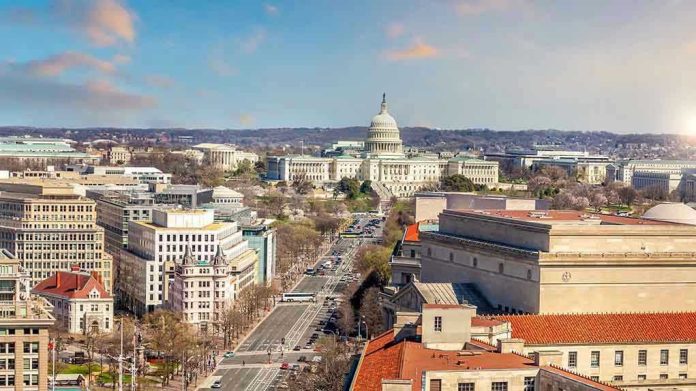
Federal intervention in Washington, DC policing has triggered a dramatic drop in violent crime, but fierce debate now rages over constitutional limits and the future of local control.
Story Snapshot
- DC crime rates have plummeted since Trump’s National Guard deployment and federal policing takeover in August 2025.
- Violent crimes, including homicide and robbery, show double-digit percentage declines compared to prior years.
- Experts warn against attributing the entire drop to the federal crackdown, noting a downward trend since 2023.
- Conservative supporters hail the intervention as a victory for public safety, while critics protest federal overreach and civil liberties risks.
Federal Intervention Reshapes DC Crime Landscape
President Donald Trump’s announcement on August 11, 2025, of a federal policing takeover and National Guard deployment marked a historic shift in Washington, DC’s approach to public safety. Citing persistently high crime rates and a spike in violent offenses through 2023, the administration moved swiftly to assert federal authority over local law enforcement—a power enabled by DC’s unique status as a federal district. Within days, citywide crime statistics reflected sharp declines; reports claim that since August 13, murders have ceased, and violent and property crime rates are down across the board. For many conservative observers, this turnaround validates calls for stronger law-and-order measures after years of frustration over rising crime and perceived local mismanagement.
Official data released by the DC Metropolitan Police Department on August 22 show homicide rates down 12%, sex abuse down 49%, and violent crime overall down 27% year-over-year. Robbery and assault with dangerous weapons have dropped by 30% and 19%, respectively. Property crimes have fallen 5%, contributing to an 8% reduction across all categories. This marks the lowest violent crime levels in decades, reversing a trend that began in 2020 with pandemic-era unrest, “defund the police” activism, and surging incidents involving repeat juvenile offenders. The administration claims credit for decisive action, contrasting the rapid improvements with previous Democratic leadership, which many conservative readers saw as failing to protect citizens and enforce the law.
Political and Social Tensions Erupt Over Policing Control
While thousands of DC residents report a renewed sense of safety, the federal crackdown has also ignited intense political opposition. The city’s Democratic mayor and council have publicly condemned the intervention, warning of government overreach and the erosion of local autonomy. Activist groups, including Black Lives Matter, have staged nightly protests, arguing that militarized policing undermines civil rights and community trust. Legal experts caution that the scale of federal involvement sets a precedent that could be invoked in other cities, raising constitutional questions about the balance of power between local and federal authorities. Yet, for supporters, the swift reduction in crime is seen as justification for robust federal action to restore order and defend public safety—a top priority for conservative Americans concerned with law, order, and traditional values.
Community leaders remain divided, with some welcoming the National Guard’s presence as a deterrent and others fearing long-term impacts on civil liberties. The Department of Justice has increased federal prosecution of major crimes, further shifting control from local agencies. Business owners in high-crime neighborhoods report early signs of economic recovery as safety perceptions improve, while families express hope that the new measures will protect children and restore confidence in local schools and services.
Expert Analysis and Ongoing Debate About Causes
Crime analysts and independent experts confirm a significant drop in DC crime since mid-2023, with the most dramatic declines following the August 2025 intervention. However, they caution against attributing the entire improvement solely to federal action. Multiple factors have influenced the city’s crime trajectory, including broader national trends and changes in local policing strategies. Criminologists argue that attributing complex societal shifts to a single event risks oversimplifying the problem. They emphasize that while data supports the narrative of sharp recent declines, the downward movement began prior to the federal crackdown. Civil liberties advocates continue to warn of potential risks, highlighting the need for transparency, accountability, and respect for constitutional principles in future law enforcement strategies.
Crime Plunges In Washington DC After Trump Launches Historic Crackdown https://t.co/l5EeQxrTUH
— zerohedge (@zerohedge) August 25, 2025
Looking ahead, the DC intervention may serve as a blueprint for federal responses to urban crime elsewhere, provoking debate about the limits of government power and the preservation of American values. Residents, lawmakers, and experts alike will be watching closely to see whether the gains in safety endure—and whether the costs to local control and civil rights prove justified. For conservatives who have long demanded real action and accountability, the events in Washington, DC signal both a victory and a reminder that vigilance remains essential in defending the Constitution, individual liberties, and the safety of American families.
Sources:
Assessing D.C.’s Violent Crime Trends — Jeff Asher
Fact: Yes, D.C. Crime Is Out of Control — The White House
Crime in Washington DC: What You Need to Know — Council on Criminal Justice
Metropolitan Police Department Daily Crime Report — DC.gov
Violent Crime in DC Hits 30-Year Low — U.S. Department of Justice



